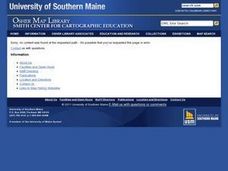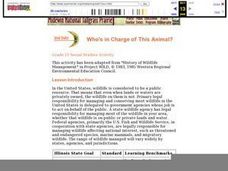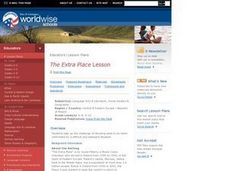Curated OER
Composting With Worms
Third graders predict what happen in two (control and experiment) containers -- one with soil and trash, the other with soil, trash, and worms.
Curated OER
The Layers of the Rainforest
Fourth graders identify the different layers of the rainforest and distinguish between the plant and life forms that go along with each layer. They access websites imbedded in this plan and answer questions and draw pictures of plants...
Curated OER
Use of the Forest in the Economic Evolution of Oakville, Pennsylvania
Students explore forest usage and the ways which it affected the development of Oakville. They identify the technological advances that shaped forest based industries, and the current challenges facing the community of Oakville.
Curated OER
Chart Making for Navigators
Students discuss the importance and function of nautical maps for sailors. They, in groups, take soundings of a simulated bay in a shoebox and develop a nautical chart that enable them to navigate the shoebox safely.
Curated OER
Charting Neptune's Realm: Profiles
Students identify and describe the importance of nautical profiles in early navigation. They draw a profile of a street or mall and explore the effectiveness of different types of directions.
Curated OER
Externalities, Property Rights and Pollution
Students discuss the positive and negative externalities of various situations. They use the concept of property rights in discussing specific problems.
Curated OER
What is Energy?
Youngsters take a look at the foods they eat, and how they provide energy for them to do things. They look at how body uses the food energy to create movement. Pupils also look at toys/devices in the room that need electrical energy...
Curated OER
Who's in Charge of This Animal?
Eleventh graders study wildlife management and identify the appropriate government agencies that are in charge. They examine different wildlife management techniques. They write a letter showing interest in the activities of one of the...
Curated OER
The Extra Place
Students read and discuss the story of a Peace Corps volunteer's experiences in Poland. They read and write a response to the story, and participate in a class analysis about their own personal decision regarding the story.
Curated OER
You Are What You Eat: Chemical Residues and Consumers
High schoolers determine how evidence gained from a simulated test for the presence of pesticide residues can be used to determine risk. They use peas to simulate pesticide residue testing.
Curated OER
Economics: Actions of Government
Students examine the susceptibility of legislators to agricultural lobbyists to support subsidy programs. In small groups, they role-play as members of interest groups that might be affected by inflation.
Curated OER
Externalities, Property Rights and Pollution
Learners identify the various externalities for any type of production. Using that information, they examine situations in which they are positive and negative. They discuss government efforts to protect the environment and humans. In...
Curated OER
Economics for Leaders Performance Assessment
Pupils participate in a scenerio in which they are assessed on the material in previous lessons. In groups, they prepare a presentation based on their solutions to the given problem. They develop their critical thinking skills applying...
Curated OER
UV light & Ozone layer
Middle-school meteorologists absorb information about ultraviolet radiaton and consider the ozone layer. The book that learners are supposed to refer to is not available, so you might want to locate some graphics or posters detailing the...
Curated OER
Hos Do the Jaguar and Howler Monkeys in Belize Depend on Us?
First graders access the internet and use the sites provided to research Belize, and in particular, the Howler Monkey and Jaguar. Students participate in activities/centers utilizing the information they discovered.
Curated OER
Speakers in Action
Tune into C-Span and tape politicians delivering testimony before congress. Class members view these tapes, formulate a rubric for rating the effectiveness of such a speech, and then emulate best practices and include them in their own...
Curated OER
March Answer Key
In this Easter worksheet, students read a letter to their parents. The 10 words in italics can also be removed in order to create a fill-in-the blank exercise.
Curated OER
Protecting Philippine Reefs
Students watch a slide show about the Philippine Reefs to explore the topic of fish populations. In this reef and fish population lesson, students watch a slide show about fish populations and how the Peace Corps works with Filipinos to...
Curated OER
The Extra Place Lesson
Students explore communication skills. In this Peace Corps lesson, students read "The Extra Place," by Susan Peters and discover Polish cultural traditions. Students consider how they would respond in a scenario that challenges their...
Curated OER
The Hudson's Ups and Downs
Even rivers have tides. Older elementary schoolers will discuss the Hudson River and how weather, water craft, and the ocean cause tidal fluctuation. They will examine a series of line graphs that depict tidal fluctuation, then analyze...
Curated OER
Mapping Where Animals Live
What type of reptiles live in New York State? This lesson plan gets the class thinking about what factors determine where particular animals live. They analyze the Hudson Valley environment, identify specific reptile and amphibian...
Curated OER
Exploring the Hudson in 1609
Learners follow the journey of Henry Hudson down the river with his name. Using journal entries and maps, they learn about its exploration. They use maps to identify stages of the journey, and practice converting distances into miles.
Curated OER
A Tooth for a Tooth
Learners classify mammals as carnivores or herbivores. They look at a set of pictures of animal skulls, observing the shape and size of the teeth, and identify herbivores and carnivores.
Curated OER
Blind as a Bat?
Imagine using your ears and voice to see. That is what bats do with echolocation. Demonstrate how echolocation works with this fun game for your classroom. Buzz, buzz!

























